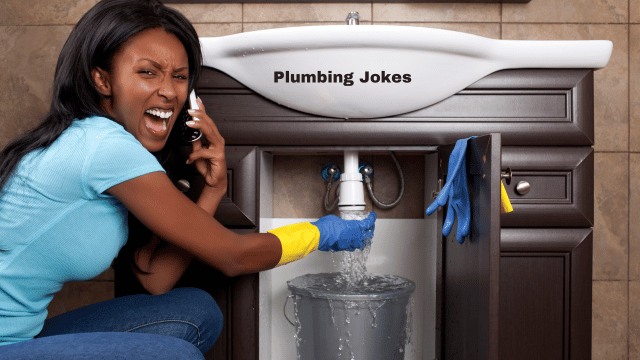Humor is an essential part of human interaction, serving as a social lubricant and a means of bonding. In various professions, humor is used to lighten the mood, reduce stress, and foster camaraderie. Plumbing, a trade that involves practical skills and sometimes challenging situations, is no exception. Plumbing jokes are a unique subset of humor that combines wit with the realities of the plumbing profession. This blog post explores the world of plumbing jokes, their origins, significance, and how they serve as a coping mechanism in the industry.
The Role of Humor in Plumbing
Humor plays a significant role in many professions, and plumbing is no exception. For plumbers, humor can help navigate the day-to-day challenges of the job, which often involves physically demanding work, unexpected surprises, and occasionally unpleasant situations. Plumbing jokes provide a means of diffusing tension and creating a more relaxed work environment.
Why Humor is Important in the Workplace
Humor in the workplace is not just about having fun; it has tangible benefits. It can improve teamwork, enhance communication, and increase job satisfaction. For plumbers, who often work in challenging conditions, humor can make a significant difference in how they perceive their work and interact with clients and colleagues.
Coping with Stress Through Humor
Plumbing can be a high-stress job. Dealing with emergencies, navigating tight spaces, and handling hazardous materials can be overwhelming. Plumbing jokes serve as a form of stress relief, allowing plumbers to laugh at the absurdities they encounter and maintain a positive outlook.
Types of Plumbing Jokes
Plumbing jokes come in various forms, each serving a different purpose. Some are light-hearted and meant for a quick laugh, while others are more elaborate, involving wordplay or situational humor.
One-Liners and Puns
One-liners and puns are among the most popular forms of plumbing jokes. They are short, witty, and often involve wordplay related to plumbing terms and concepts. These jokes are easy to remember and share, making them a staple in the plumbing community.
Examples:
- “Why did the plumber break up with his girlfriend? She was too draining.”
- “What do plumbers and teachers have in common? They both deal with pipes.”
Situational Jokes
Situational jokes are based on common experiences in the plumbing industry. These jokes often highlight the quirks and challenges of the job, allowing plumbers to laugh at situations they have likely encountered themselves.
Examples:
- “A plumber walks into a bar. The bartender says, ‘Hey, we don’t serve your kind here.’ The plumber replies, ‘That’s okay, I’m here to fix your leak.'”
- “How many plumbers does it take to change a light bulb? None. That’s an electrician’s job!”
Dark Humor
While not for everyone, dark humor is also prevalent in the plumbing community. These jokes often involve more serious situations, such as accidents or mishaps, and use humor to cope with the potential dangers of the job.
Examples:
- “Why did the plumber always carry a plunger? To keep from getting in over his head.”
- “Plumbing is like surgery; you have to get in and out without losing any parts.”
The Evolution of Plumbing Jokes
Plumbing jokes, like all forms of humor, have evolved over time. The nature of these jokes reflects changes in the industry, technology, and social norms. Understanding this evolution provides insight into how humor adapts to meet the needs of its audience.
Early Plumbing Humor
In the early days of plumbing, jokes were simple and often centered around common tools and tasks. These jokes were primarily shared verbally among tradesmen and were a way of building camaraderie in a physically demanding job.
Modern Plumbing Jokes
With the advent of social media and the internet, plumbing jokes have become more sophisticated and widespread. Memes, videos, and online forums have allowed plumbers to share jokes more easily, expanding their reach and impact.
Modern plumbing jokes often incorporate current events, technology, and cultural references, making them more relevant to today’s plumbers. The evolution of these jokes reflects the changing landscape of the plumbing industry and the broader societal context in which it operates.
The Psychology Behind Plumbing Jokes
Humor is a complex psychological phenomenon, and plumbing jokes are no exception. Understanding why these jokes are funny and why they resonate with plumbers requires an exploration of the psychological mechanisms at play.
Relief Theory
One of the primary psychological theories that explain humor is the Relief Theory. This theory suggests that humor serves as a release of psychological tension. In the context of plumbing, jokes can provide relief from the stress and challenges of the job, offering a momentary escape from reality.
Incongruity Theory
Another theory that explains humor is the Incongruity Theory, which posits that humor arises when there is a discrepancy between what is expected and what occurs. Plumbing jokes often rely on this incongruity, playing on the unexpected twists and turns that can happen during a plumbing job.
Social Bonding
Humor also plays a crucial role in social bonding. Sharing plumbing jokes creates a sense of community among plumbers, fostering a shared identity and strengthening social ties. This bonding is particularly important in a profession where teamwork and trust are essential.
The Impact of Plumbing Jokes on the Industry
Plumbing jokes, while seemingly trivial, can have a significant impact on the industry. They shape how plumbers perceive their work, interact with each other, and present themselves to the public.
Shaping Professional Identity
Plumbing jokes contribute to the professional identity of plumbers. They highlight the unique aspects of the trade, from the tools used to the situations encountered. By laughing at themselves and their profession, plumbers reinforce a sense of pride and resilience in their work.
Enhancing Customer Relations
Humor can also be a powerful tool in customer relations. Plumbers who use jokes to lighten the mood can create a more positive experience for their clients, making them more likely to return for future services. A well-timed joke can ease tension and build rapport, turning a potentially stressful situation into a more enjoyable one.
Promoting the Trade
Plumbing jokes can also serve to promote the trade to a wider audience. By making plumbing more relatable and approachable, these jokes can help break down stereotypes and encourage more people to consider a career in the industry.
Famous Plumbing Jokes and Their Origins
Some plumbing jokes have become well-known within the community, gaining a sort of legendary status. These jokes often have interesting origins, reflecting the culture and history of the plumbing profession.
The Plumber’s Nightmare
One of the most famous plumbing jokes is the “plumber’s nightmare,” which typically involves a complicated, messy, or absurd situation that only a plumber would understand. This joke has its roots in the early days of modern plumbing when plumbers often faced chaotic and unpredictable work environments.
Flush With Success
The phrase “flush with success” has become a humorous saying among plumbers, playing on the dual meaning of “flush” in the context of plumbing and financial success. This joke highlights the ingenuity and wordplay that is characteristic of plumbing humor.
The Future of Plumbing Jokes
As the plumbing industry continues to evolve, so too will its humor. The future of plumbing jokes will likely reflect changes in technology, environmental concerns, and societal attitudes toward trade professions.
Adapting to Technological Advances
As plumbing technology advances, new jokes will emerge that reflect these changes. For example, jokes about smart home plumbing systems or eco-friendly fixtures may become more common as these technologies become more widespread.
Addressing Environmental Issues
With increasing awareness of environmental issues, plumbing jokes may also begin to reflect concerns about water conservation and sustainability. Humor can be a powerful way to raise awareness and encourage positive behavior change.
Expanding the Audience
As plumbing jokes continue to spread through social media and other platforms, their audience may expand beyond just plumbers. This broader reach could help demystify the profession and promote a more positive image of plumbers and the work they do.
Conclusion
Plumbing jokes are more than just a way to pass the time or get a laugh; they are a reflection of the plumbing profession itself. Through humor, plumbers can cope with the challenges of their work, build community, and promote their trade. As the industry evolves, so too will its humor, continuing to provide a unique and valuable perspective on the world of plumbing.
FAQs About Plumbing Jokes
1. What are plumbing jokes?
Plumbing jokes are a type of humor specifically related to the plumbing profession. They often involve wordplay, situational humor, and references to tools, tasks, and experiences common in plumbing work.
2. Why do plumbers use humor on the job?
Plumbers use humor to lighten the mood, reduce stress, and foster camaraderie among colleagues. Humor can also help in dealing with challenging situations and building rapport with clients.
3. Are plumbing jokes appropriate for all audiences?
While most plumbing jokes are light-hearted and suitable for all audiences, some may involve industry-specific jargon or dark humor that might not be appropriate for everyone. It’s essential to consider the audience before sharing a joke.
4. How have plumbing jokes evolved over time?
Plumbing jokes have evolved alongside the industry, reflecting changes in technology, culture, and social norms. Early jokes were simpler and shared verbally, while modern jokes often incorporate digital media and contemporary references.
5. Can plumbing jokes help promote the trade?
Yes, plumbing jokes can help promote the trade by making it more relatable and approachable. They can break down stereotypes, encourage interest in the profession, and highlight the unique aspects of the plumbing industry.











